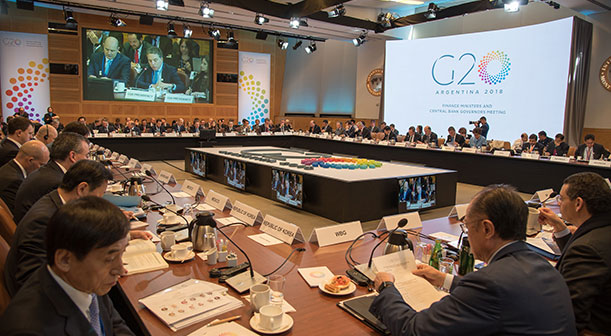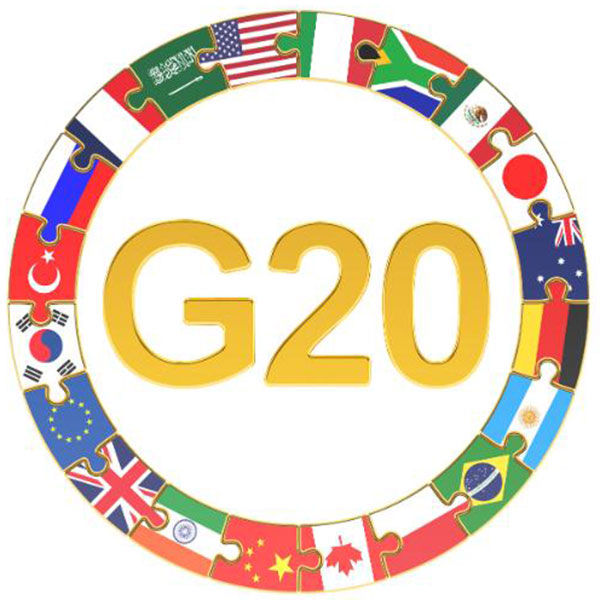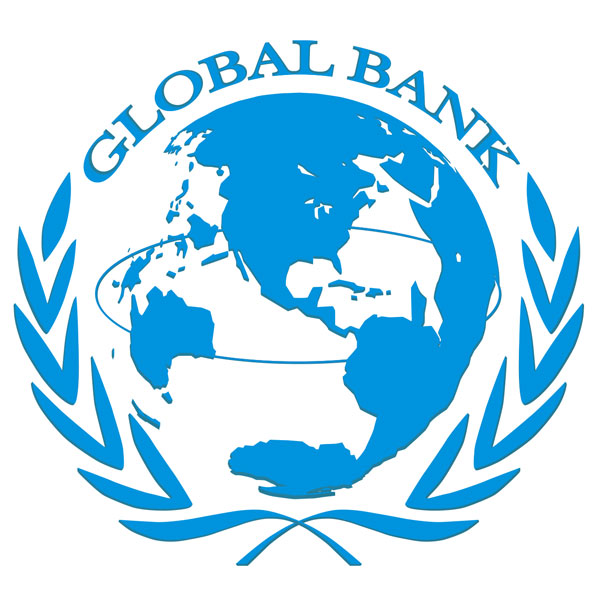The Global Bank and the G-20

The Global Bank Group (the “Bank Group”) is a development financial institution with an agenda driven by G-7/G-8 and G-201-priorities when and where it is appropriate; its leading priority is to promote global economic and social development.
The Global Bank Group action is following the priority of the G-7/G-8 and G-20 to foster support, in particular for sustainable development, infrastructure investment, long-term finance and financing for climate change. Each remains key priorities, as they are the main drivers of growth and employment, to boost global growth. The relevance of the Global Bank Group as a tool to foster growth and jobs supports the view that the G-20 institutions shall be represented in the G-20 work as the implementation bodies of agreed policies.
The Group of Twenty
The Group of Twenty1 (G-20) is the premier forum for international economic cooperation and decision-making, with members from 19 countries plus the European Union (EU). G-20 leaders, finance ministers, and central bank governors meet regularly to discuss ways to strengthen the global economy, discuss growth strategies, and improve financial regulation.
The G-20 provides a unique forum for tackling development challenges. If used effectively, it has significant potential to drive reforms to improve the enabling environment for development and to remove constraints to sustainable growth and poverty reduction. It has the convening power of the leaders of 19 of the world’s systemically significant economies and the European Union, and brings together emerging and established donors. G-20 members account for 90% of global GDP, 94% of the official development assistance (ODA) and almost 70% of the world’s population. These characteristics and the approach the G-20 takes to development make its development agenda distinct.
Interesting facts about the G20:
The G-20 is entrusted with the critical mission of addressing economic risks and challenges, promoting world economic growth, improving global economic governance and sharing development benefits among people across the world. It is committed to an open world economy with a strong partnership among members and beyond. Therefore, any subject matter that has implications on the global economy and international financial system should have its reflection onto the Global Bank agenda. With that understanding, while taking forward the ongoing G-20 agenda, Global Bank will focus on ways to make the G-20 priorities more relevant to the rest of the world, including the low-income developing countries (LIDCs).
The Global Bank Group is a group of diverse financial institutions, which however share a common mission to support the converging public policy objectives of the members of the G-20, their respective shareholders. Global Bank offers considerable financing and expertise and can thus have a strong capacity and impact in supporting the priorities set by the G-20. Global Bank action is following the priority of the G-20 to foster support, in particular for development, infrastructure investment, and long-term finance, climate change, financing for climate change, therefore remain a key priorities, as they are the main drivers of growth and employment, in order to boost global growth. The relevance of Global Bank, as a tool to foster growth and jobs, supports the view that the G-20 institutions shall be represented in the G-20 work as the implementation bodies of agreed policies.
Global Bank will work together with G-20 members to strengthen the partnership within the G-20, to fully implement the commitments at the Antalya and the previous summits, to improve the effectiveness of the G-20 in decision-making and implementation, and to further extend its influence. Based on the latest developments of the global economy and the needs of individual economies, the Global Bank will not only address outstanding issues of the moment to mitigate short-term risks, but also develop forward-looking and creative policy ideas and take collective actions to steer the world economy into the future.
In response the G-20, Global Bank has concentrated on identifying the impediments to an action more conducive environment for investment and growth through five initiatives focused on the core economic drivers of trade, infrastructure, human capital, finance, and transparency. The result of this work is 14 mutually reinforcing recommendations for action by Global Bank. These mostly new measures would help deliver on the G-20 growth target and form a blueprint for sustainable economic growth in the medium term.
In particular, Global Bank committed to support the G-20 on:
- Development,
- Infrastructure investment and long-term finance,
- Climate change,
- Financing for climate change,
- Growth with resilience,
- Trade,
- Anti-Corruption,
- Human Capital,
- Financing Growth,
- Private investment and job creation,
- Food security,
- Domestic resource mobilization,
- Knowledge sharing,
- Inclusive green growth.
To learn more about the Global Bank Disaster Risk Reduction and Reconstruction Fund, what we do and how we do it and Management and Organisation, visit the About DRRRF and the Frequently Asked Questions Section of the DRRRF Website Section.
For information about the Global Bank, please visit http://www.global-bank.org
| 1 | Member countries include Argentina, Australia, Brazil, Canada, China, France, Germany, India, Indonesia, Italy, Japan, Mexico, Russia, Saudi Arabia, South Africa, South Korea, Turkey, the United Kingdom, the United States, and the European Union. |

